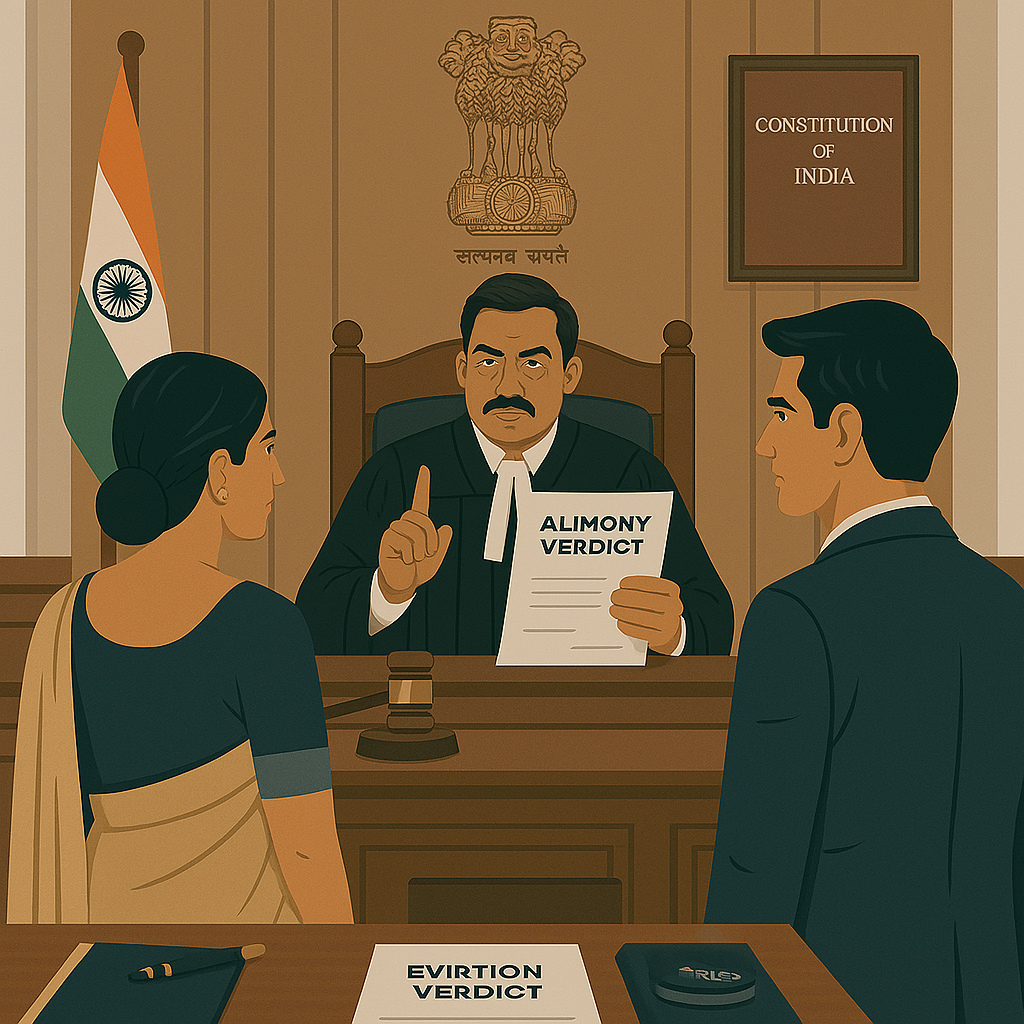The Supreme Court’s recent judgment in 2025 INSC 789 Rakhi Sadhukhan v. Raja Sadhukhan has stirred significant public and legal attention. The apex court directed a husband to pay ₹50,000 per month in alimony, reversing the ₹20,000 previously fixed by the High Court. This decision, based on factors like inflation and the wife’s financial dependence, underscores the evolving nature of alimony law in Chandigarh and across India. Whether you’re a law student trying to understand spousal maintenance or a potential client navigating a divorce, this case offers valuable insights into how courts view long-term financial support regardless of changed circumstances or remarriage.
Understanding Alimony Law in Chandigarh
Alimony, also known as spousal maintenance, refers to the financial support a court orders one spouse to pay to the other after separation or divorce. In Rakhi Sadhukhan v. Raja Sadhukhan, the court awarded a higher alimony amount despite several significant objections.
Background of the Case
- Marriage Duration: The couple married before 2008 and separated that year.
- Divorce Finalized: The divorce was granted in 2019.
- Current Circumstances: As of 2025, they have been separated for over 17 years.
- Dependent Son: Their son, once a point of contention, is now 26 and financially independent.
Despite this, the wife remained unmarried and claimed she had no independent income. While the husband produced salary slips, ITRs, and showed his financial burden (including support for aged parents and a new spouse), the court still found in favor of the ex-wife.
Key Legal Findings
Alimony Can Continue Indefinitely
Even long after separation, courts can grant or enhance alimony if the receiving spouse is not financially independent.
Standard of Living Matters
The Supreme Court emphasized that the woman’s standard of living during the marriage must be maintained post-divorce, as per precedents under Section 144 of the BNSS.
Inflation Justifies Reassessment
Inflation was a critical factor in increasing the monthly maintenance. What ₹20,000 could buy in 2019 no longer suffices in 2025.
Remarriage of Husband Not a Ground to Deny Maintenance
The husband’s remarriage and new financial responsibilities did not exempt him from his obligation to support his first wife.
Legal Takeaways for Divorce and Maintenance in Chandigarh
If you’re involved in a divorce case in Chandigarh, this ruling serves as a caution. Indian courts continue to adopt a gender-sensitive and welfare-centric approach in maintenance cases.
Here are some practical implications:
- A man’s remarriage does not reduce his responsibility.
- A woman need not prove cruelty or fault to receive maintenance.
- Property given during litigation (like a flat) may not count against fresh maintenance orders.
- Financial documents like ITRs and bank statements are not always decisive in reducing alimony.
Maintenance Orders Are Subject to Change
Courts have the power to modify earlier orders. You may receive or owe more money even after years have passed since the initial order.
Importance of Legal Representation
Though this article doesn’t promote any law firm directly, it’s important to consult experienced family lawyers in Chandigarh when dealing with complex maintenance or alimony issues.
FAQs on Supreme Court on Alimony
1. What is the legal basis for alimony in India?
Alimony (or maintenance) is granted under several Indian laws, including the Hindu Marriage Act, 1955, Section 126 of the Bharatiya Nyaya Sanhita (BNSS), and various personal laws depending on religion. Courts assess the dependent spouse’s financial needs and the paying spouse’s capacity to pay. Lawyers in Chandigarh often refer to these laws when advising clients on maintenance claims.
2. Does a husband’s remarriage stop maintenance to the first wife?
No, a husband’s remarriage does not automatically end his obligation to support his first wife—especially if she remains unmarried and without an independent income. Courts in India, including those in Chandigarh, continue to prioritize the financial welfare of the dependent spouse.
3. Can alimony be increased after divorce?
Yes. Indian courts have the authority to revise alimony even after the divorce is finalized. Factors such as inflation, a rise or fall in income, or changes in personal circumstances may lead to modification. An advocate in Chandigarh can help file or defend such modification petitions.
4. Is property given during divorce considered part of alimony?
Not necessarily. If a property (such as a flat) was provided during the divorce or litigation, it may not be considered a substitute for monthly maintenance—unless clearly stated in a legal settlement. Courts assess whether the property fulfills ongoing financial needs.
5. How long does maintenance last in Chandigarh?
There is no fixed time limit for alimony in Chandigarh. It can be lifelong if the spouse remains unmarried and financially dependent. Courts evaluate each case based on need, ability to pay, and changes over time. Experienced divorce lawyers in Chandigarh play a crucial role in helping clients navigate such long-term obligations.




